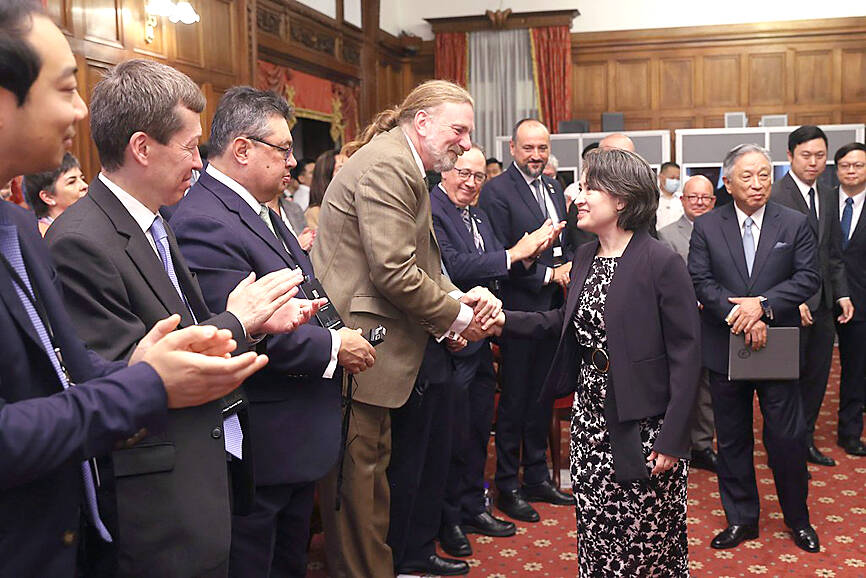Taiwan is striving to improve its self-defense against the hybrid warfare waged by China over cross-strait issues, Vice President Hsiao Bi-khim (蕭美琴) said when meeting delegates of the Inter-Parliamentary Alliance on China (IPAC) at the Taipei Guest House yesterday.
Taiwan is honored by the IPAC delegation’s presence at the Taipei Guest House, a place that has witnessed the nation’s history from the Japanese occupation and the Chinese Nationalist Party’s (KMT) single-party rule to today’s liberal and open democratic society, she said.
Hsiao said she expected to hear the opinions of the delegates and exchange ideas about important values shared among almost all their nations, such as democracy and peace.

Photo: screen grab from the Presidential Office’s Flickr account
Taiwan is facing great geopolitical challenges, as Beijing has expedited its military expansion and engaged in ongoing military activities and hybrid warfare over cross-strait issues, she said.
The IPAC delegation has arrived at a crucial moment as Taiwan is striving to enhance its self-defense, as well as its democratic, social and economic resilience, she added.
On behalf of the IPAC delegation, Japaneses Diet member Yasue Funayama delivered an address at the meeting, but her remarks were not made public.
The IPAC, which consists of hundreds of lawmakers from 35 nations concerned about China’s threat to global democracy, is holding its annual summit in Taipei today and tomorrow, with 48 lawmakers from 24 nations across five continents set to participate.
“Cross-strait stability will be at the top of the agenda, with high level contributions from the Taiwanese government and world-leading experts,” the IPAC said in a statement. “It will be the largest parliamentary delegation ever to visit Taiwan in an institutional capacity.”
Legislators from the Democratic Progressive Party and Taiwan People’s Party would also be attending this year’s summit.
DPP Legislator Fan Yun (范雲) yesterday called on her KMT counterparts to attend the Taipei summit to show that parties from across the political spectrum are willing to “make friends” with lawmakers from around the globe.
In response, KMT caucus deputy secretary-general Lin Szu-ming (林思銘) said the KMT would “not obstruct” its members who want to attend the summit.
The IPAC released a statement on Sunday condemning China for allegedly pressuring its members not to fly to Taiwan to attend the summit.
The members were contacted by the Chinese embassies in their respective nations as part of a “clear attempt to intimidate and dissuade” them from traveling to Taiwan.
Formed in 2020, the IPAC has more than 250 members from 35 legislatures and the European Parliament. It is an international, cross-party alliance of lawmakers from democratic nations focused on relations with China.

AIR SUPPORT: The Ministry of National Defense thanked the US for the delivery, adding that it was an indicator of the White House’s commitment to the Taiwan Relations Act Deputy Minister of National Defense Po Horng-huei (柏鴻輝) and Representative to the US Alexander Yui on Friday attended a delivery ceremony for the first of Taiwan’s long-awaited 66 F-16C/D Block 70 jets at a Lockheed Martin Corp factory in Greenville, South Carolina. “We are so proud to be the global home of the F-16 and to support Taiwan’s air defense capabilities,” US Representative William Timmons wrote on X, alongside a photograph of Taiwanese and US officials at the event. The F-16C/D Block 70 jets Taiwan ordered have the same capabilities as aircraft that had been upgraded to F-16Vs. The batch of Lockheed Martin

US President Donald Trump yesterday announced sweeping "reciprocal tariffs" on US trading partners, including a 32 percent tax on goods from Taiwan that is set to take effect on Wednesday. At a Rose Garden event, Trump declared a 10 percent baseline tax on imports from all countries, with the White House saying it would take effect on Saturday. Countries with larger trade surpluses with the US would face higher duties beginning on Wednesday, including Taiwan (32 percent), China (34 percent), Japan (24 percent), South Korea (25 percent), Vietnam (46 percent) and Thailand (36 percent). Canada and Mexico, the two largest US trading

GRIDLOCK: The National Fire Agency’s Special Search and Rescue team is on standby to travel to the countries to help out with the rescue effort A powerful earthquake rocked Myanmar and neighboring Thailand yesterday, killing at least three people in Bangkok and burying dozens when a high-rise building under construction collapsed. Footage shared on social media from Myanmar’s second-largest city showed widespread destruction, raising fears that many were trapped under the rubble or killed. The magnitude 7.7 earthquake, with an epicenter near Mandalay in Myanmar, struck at midday and was followed by a strong magnitude 6.4 aftershock. The extent of death, injury and destruction — especially in Myanmar, which is embroiled in a civil war and where information is tightly controlled at the best of times —

China's military today said it began joint army, navy and rocket force exercises around Taiwan to "serve as a stern warning and powerful deterrent against Taiwanese independence," calling President William Lai (賴清德) a "parasite." The exercises come after Lai called Beijing a "foreign hostile force" last month. More than 10 Chinese military ships approached close to Taiwan's 24 nautical mile (44.4km) contiguous zone this morning and Taiwan sent its own warships to respond, two senior Taiwanese officials said. Taiwan has not yet detected any live fire by the Chinese military so far, one of the officials said. The drills took place after US Secretary